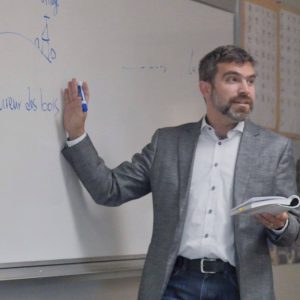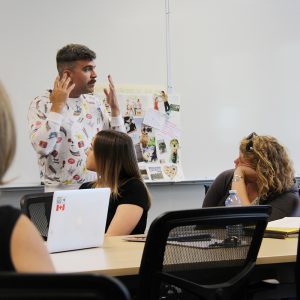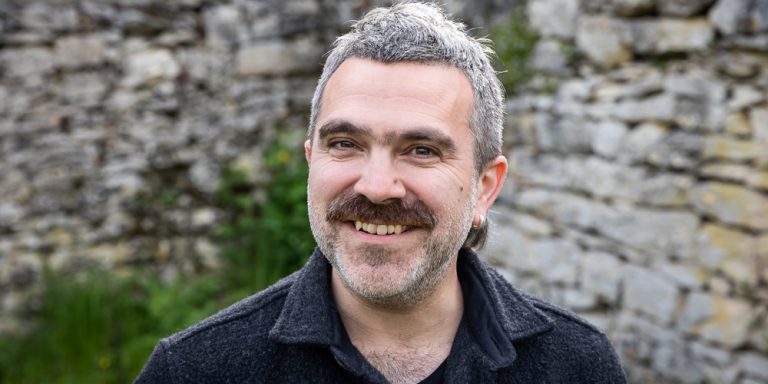Francis Langevin is an educator, cultural activist and event organizer, and film buff. He has been a faculty member at UBC Okanagan since 2015 teaching French language and literature in the Educational Leadership Stream in the Department of Languages and World Literatures.
Francis shared some insights on his teaching and research practices here at UBC Okanagan.
Give us some insight on your teaching and research.
My best friend Nadia, who has always been a role-model for my teaching, calls me Docteur Lecteur. She implies that I teach people how to read (a lecteur is a reader, in French). It’s true that I do that when I teach Literature and Film, and Culture: that’s also what my graduate degrees and research publications are about.
Those research baby steps are not meant to “improve quality of life” as ostensibly as, say, pasteurization or vaccines do, but they leave traces and they make visible and legible the work of humans who we are talking about, recording, reading, translating what it means to live in our times (or in their times). Those reading skills come in handy to understand the world we live in, and it can orient the decisions and the actions we make as citizens. Reading other people’s stories is a great way to develop empathy, which I think we all need more of.
What most excites and challenges you about your field of work?
I get to teach students who are learning a language almost from scratch and I sometimes see them only a few year later majoring in French, speaking to me in the language I grew up hearing. That’s exciting! But also, I get to hang out with multilingual individuals: other profs in my department (Languages & World Literature), and of course students who come from everywhere. In a group of 35 students, I can usually count as many as twelve other languages spoken! I’ve lived in a linguistic minority for ten years now, not always being able to express myself in French as often as I would like. It’s a challenge that I share with a lot of students. So I am thrilled to be given so many hours a week to speak it! Teaching languages and literature allows me to read texts and watch movies as a group, which really feels like a treat.
What kind of learning experiences do you lead outside of the classroom?
I’m really interested in facilitating connections between communities. I do that in my personal life a lot, as a citizen, a volunteer or an activist I guess. I make it a point to bring that to the university, and I invite students to do so too! This can mean organizing events, such as film screenings (Petit French Film Festival) or cabarets (Pony, with Michael V. Smith), or meetings with artists. But more generally, it means breaking the walls of the classroom to make the learning experience as meaningful for students as for their communities. They take something to my classroom; they take something back to where they continue on their journey.
I program or help organize cultural events. Mostly films and literary events. I work with the Kelowna Film Society and the Centre culturel francophone de l’Okanagan, and together I’d say we program about 45 films per year. When I moved here from Toronto, people were worried that I would miss the cultural offer of the metropolis. That is sometimes true, but that just means you have to make the effort of creating those opportunities.
As a teacher, I try to integrate what is happening in town and within FCCS, such as the Living Things Festival, the reading series, and visiting speakers, to classroom as much as possible. I think that making room for those events to my students in assignments or lectures really helps to break the walls of the classroom, and in return, it makes those events open to new people. It all comes down to community building, really.
How did you know you wanted to be a professor?
I had the chance to teach two lectures on Quebec Culture for students of University in the Community, a “humanities-based program for low-income residents in the city of Toronto” hosted at Innis College, University of Toronto. After one hour during the first lecture, we took a break and I was overwhelmed by the joy of teaching without a curriculum. I went outside and wept for the whole break. It has transformed my approach to teaching completely: I was awarded the privilege to teach personally; it had not occurred to me before that I could decide what mattered for a course, and adapt it for different audiences or purposes. That’s a great gift. That is a responsibility, of course, but also that is a wonderful freedom to share your passion, your knowledge – and also to witness students figure out what is making them vibrate with enthusiasm.
What do you enjoy about living in the Okanagan?
People. Apricots in my yard. Peaches. Openness. Lake down the street. My friends. Powder snow. Four seasons. Kindness. Okanagan nations. “Let’s make it happen” attitude. My husband. Clothes that dry in a day inside. Views. Opportunity. Artists and crafters. Cherries. Newcomers and expats.


